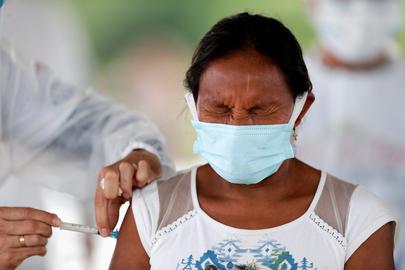This article is part of IranWire's ongoing coverage of Covid-19 disinformation in different countries, in partnership with Health Studio.
By Ximena Herrera for Health Studio
The first case of Covid-19 in Colombia was confirmed on March 6, 2020 after a young woman travelled to the capital city of Bogata from Milan in Italy, then a hotspot for the disease. There have since been more than 2.3 million cases in the country, and more than 61,000 recorded deaths. As of last week, there were some 30,000 active cases, according to the Colombian government.
As well as its impact on health, the virus has brought economic woes and social unrest to the country, creating the ideal conditions for the rapid spread of disinformation designed to trick and scam desperate members of the public.
Colombia was no stranger to fake news before Covid-19 hit. A number of politicians have been ridiculed in recent years for sharing fake posts on social media, including former vice president Francisco Santos, who tweeted a link to an article from the satirical website Actualidad Panamericana as if it were real news. Since the start of the pandemic, social media has become a vehicle for the dissemination of rumours about Covid-19.
An early piece of fake news shared widely in Colombia was a baseless and disturbing claim that Covid-19 was created by a cartel who would pay doctors millions of pesos for each patient that died. Doctors Without Borders warned last summer that the rapid spread of fake news had made many Colombians afraid to seek medical attention.
The International Committee of the Red Cross has said this “climate of disinformation” has also helped fuel a surge in violence against healthcare workers. The organizations logged nearly 250 attacks on healthcare workers, facilities and vehicles in the country between January and October last year.
Vaccine Disinformation in Colombia
More recent examples of fast-spreading Covid-19 disinformation have preyed on the public’s desire for vaccines, which the country has been administering since mid-February.
In Bogota, posters falsely offering the sale of various vaccines have been pasted around the city. Photos of the notices quickly made their way to Twitter, where they quickly went viral.

Poster reads: “We have all the brands, AstraZeneca, Pfizer, Janssen, Sputnik, SonPharm and more. 100% original, business opportunity, we do nacional shipments. They don’t need refrigeration. Full discretion. Call: 3574434801”
Health authorities immediately stepped in to warn Colombians not to be fooled, explaining that the sale of Covid-19 shots of any brand is not allowed. The posters attracted so much attention that even the Colombian Ministry of Health intervened through the official Twitter account.

Tweet reads: “Attention! Vaccines against COVID-19 are NOT for sale in any health center, establishment, website or social network. Do not fall into traps like this, which seek to rob you and could put your health at risk. Find out only through http://minsalud.gov.co.”
The creator of these posters, a young man who goes by the pseudonym Maniatico, claimed in an interview with Health Studio that his hoax posters were a form of art designed to encourage Colombians to become more informed, rather than a scam to sell fake vaccines.
“Politicians, personalities and the media repeated the information as if it was real,” he said. Members of the media “came to say that Bogota and other cities in Colombia woke up full of these posters” he added, explaining that he did not expect his stunt to go viral.
Mantiaco, who regularly posts satirical versions of famous adverts to Instagram, said that errors in the posters should have made it clear they were not real. The poster claimed the vaccines on offer did not need refrigeration, for example, when in fact some must be stored as low as minus 80 degrees celsius. And one of the shots on offer—the Janssen vaccine—is not yet available in the country.
But his posters tricked many Colombians who wanted to get vaccinated. Although the phone number quoted was fake, he admitted to Health Studio that he got lots of direct messages on Instagram requesting shots. He said he responded to them all with the words: “Read well.”
In spite of the fact his own posters were a hoax, he added: “We do not read and we get carried away by headlines that are full of fake news. The big question [we should be asking is] are the campaigns by government entities well developed? How much do Colombians know about vaccination?”
“Joking” About Death
In spite of Mantiaco’s statements, the Colombian government does offer information about its vaccination plan on its official website and through its social media channels. The government says it plans to vaccinate 35 million Colombians (just over two-thirds of the population) in two phases, starting with the most vulnerable groups. The process will be defined, the website vows, by “beneficence, solidarity, equity and justice, transparency, progressiveness, and public interest.”
Attorney General Margarita Cabello recently said that “jokes” cannot be made in a situation where lives are at risk people are dying. Scammers, she added, were ready to take advantage of people’s naivety, fear, and need.
Hoaxes like Mantiaco’s posters can trick members of the public and convince them there are other, non-official, ways of getting vaccinated. This leaves people vulnerable to financial scams and even taking fake and potentially dangerous sham “vaccines.”
visit the accountability section
In this section of Iran Wire, you can contact the officials and launch your campaign for various problems


























comments